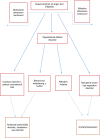Oppositional defiant disorder: current insight
- PMID: 29238235
- PMCID: PMC5716335
- DOI: 10.2147/PRBM.S120582
Oppositional defiant disorder: current insight
Abstract
Oppositional defiant disorder (ODD) is diagnosed broadly on the basis of frequent and persistent angry or irritable mood, argumentativeness/defiance, and vindictiveness. Since its inception in the third Diagnostic and Statistical Manual of Mental Disorders, epidemiological and longitudinal studies have strongly suggested a distinct existence of ODD that is different from other closely related externalizing disorders, with different course and outcome and possibly discrete subtypes. However, several issues, such as symptom threshold, dimensional versus categorical conceptualization, and sex-specific symptoms, are yet to be addressed. Although ODD was found to be highly heritable, no genetic polymorphism has been identified with confidence. There has been a definite genetic overlap with other externalizing disorders. Studies have begun to explore its epigenetics and gene-environment interaction. Neuroimaging findings converge to implicate various parts of the prefrontal cortex, amygdala, and insula. Alteration in cortisol levels has also been demonstrated consistently. Although a range of environmental factors, both familial and extrafamilial, have been studied in the past, current research has combined these with other biological parameters. Psychosocial treatment continues to be time-tested and effective. These include parental management training, school-based training, functional family therapy/brief strategic family therapy, and cognitive behavior therapy. Management of severe aggression and treatment of co-morbid disorders are indications for pharmacotherapy. In line with previous conceptualization of chronic irritability as a bipolar spectrum abnormality, most studies have explored antipsychotics and mood stabilizers in the management of aggression, with limited effects.
Keywords: externalizing disorders; genetics; nosology.
Conflict of interest statement
Disclosure The authors report no conflicts of interest in this work.
Figures


References
-
- American Psychiatric Association . Diagnostic and Statistical Manual of Mental Disorders. 5th ed. Arlington, VA: APA; 2013.
-
- American Psychiatric Association . Diagnostic and Statistical Manual of Mental Disorders. 2nd ed. Arlington, VA: APA; 1972.
-
- Jenkins RL, Boyer A. Types of delinquent behavior and background factors. Int J Soc Psychiatry. 1968;14(1):65–76. - PubMed
-
- Quay HC. Dimensions of personality in delinquent boys as inferred from the factor analysis of case history data. Child Dev. 1964;35(2):479–484. - PubMed
-
- American Psychiatric Association . Diagnostic and Statistical Manual of Mental Disorders. 3rd ed. Arlington, VA: APA; 1980.
Publication types
LinkOut - more resources
Full Text Sources
Other Literature Sources
Miscellaneous

